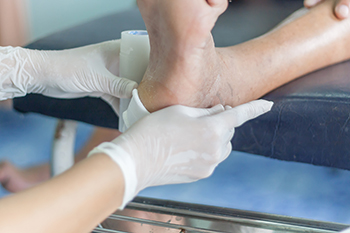
An open wound on the foot can be painful. It is defined as a break or cut in the skin, and in most cases, is found on the surface of the skin. More serious wounds affect the deeper tissues of the foot, and this can spread to the tendons, muscles, and nerves. Minor cuts are often treated by cleaning the wound, followed by covering it with a protective bandage. Stitches may be necessary to accelerate the healing process, in addition to possibly using an adhesive glue. For more serious wounds, medical attention is often sought for relief. The wound may become dirty, and this is the term that is used when germs have entered the wound. This can lead to a possible infection, and recovery instructions must be strictly followed to prevent scarring. If you have a wound on your foot, it is urgently suggested that you are under the care of a podiatrist who can provide the best treatment for the type of foot wound you have.
Wound care is an important part in dealing with diabetes. If you have diabetes and a foot wound or would like more information about wound care for diabetics, consult with Emmanuel Bustos, DPM from New York. Our doctor will assess your condition and provide you with quality foot and ankle treatment.
What Is Wound Care?
Wound care is the practice of taking proper care of a wound. This can range from the smallest to the largest of wounds. While everyone can benefit from proper wound care, it is much more important for diabetics. Diabetics often suffer from poor blood circulation which causes wounds to heal much slower than they would in a non-diabetic.
What Is the Importance of Wound Care?
While it may not seem apparent with small ulcers on the foot, for diabetics, any size ulcer can become infected. Diabetics often also suffer from neuropathy, or nerve loss. This means they might not even feel when they have an ulcer on their foot. If the wound becomes severely infected, amputation may be necessary. Therefore, it is of the upmost importance to properly care for any and all foot wounds.
How to Care for Wounds
The best way to care for foot wounds is to prevent them. For diabetics, this means daily inspections of the feet for any signs of abnormalities or ulcers. It is also recommended to see a podiatrist several times a year for a foot inspection. If you do have an ulcer, run the wound under water to clear dirt from the wound; then apply antibiotic ointment to the wound and cover with a bandage. Bandages should be changed daily and keeping pressure off the wound is smart. It is advised to see a podiatrist, who can keep an eye on it.
If you have any questions, please feel free to contact our office located in New York, NY . We offer the newest diagnostic and treatment technologies for all your foot care needs.